 W
W"Almost Grown" is a song written and recorded by Chuck Berry. It was released as a double A-side with "Little Queenie". The song is featured in the 1973 film American Graffiti, and on its soundtrack album.
 W
W"Back in the U.S.A." is a song written by Chuck Berry that was released in 1959 and was a top 40 hit. A cover version in 1978 by Linda Ronstadt was also a hit.
"Come On" is a song written and first released by Chuck Berry in 1961. It has been recorded in many versions by many bands since its release, most notably the Rolling Stones. "Come On" failed to chart in the US Top 100, but the B-side, "Go Go Go", reached number 38 on the UK Singles Chart.
 W
W"Evil", sometimes listed as "Evil ", is a Chicago blues standard written by Willie Dixon. Howlin' Wolf recorded the song for Chess Records in 1954. It was included on the 1959 compilation album Moanin' in the Moonlight. When he re-recorded it for The Howlin' Wolf Album in 1969, "Evil" became Wolf's last charting single, reaching number 43 Billboard R&B chart.
 W
W"Forty Days and Forty Nights" is a blues song recorded by Muddy Waters in 1956. Called "a big, bold record", it was a hit, spending six weeks in the Billboard R&B chart, where it reached number seven. "Forty Days and Forty Nights" has been interpreted and recorded by a variety of artists.
 W
W"Forty-Four" or "44 Blues" is a blues standard whose origins have been traced back to early 1920s Louisiana. However, it was Roosevelt Sykes, who provided the lyrics and first recorded it in 1929, that helped popularize the song. "Forty-Four," through numerous adaptations and recordings, remains in the blues lexicon eighty years later.
 W
W"Gee", released in June 1953 by The Crows, is a song which has been credited as the first rock and roll hit by a rock and roll group. It is a doo-wop song, written by William Davis and Viola Watkins, and recorded by the Crows on the independent label, Rama Records, at Beltone Studios in New York City in February 1953. It charted in April 1954, one year later. It took a year to get recognized on Your Hit Parade. It landed No.2 on the rhythm and blues chart and No. 14 on the pop chart. It was the first 1950s doo-wop record to sell over one million records. Recorded on an independent label, it was one of the first such R&B records to crossover to the wider pop market. In fact, some, including Jay Warner, consider it as the first of the "rock n' roll records".
 W
W"Got My Mojo Working" is a blues song written by Preston "Red" Foster and first recorded by R&B singer Ann Cole in 1956. Foster's lyrics describe several amulets or talismans, called mojo, which are associated with hoodoo, an early African-American folk-magic belief system.
 W
W"Here Comes the Judge" is a song and single by American soul and comedy singer Pigmeat Markham first released in 1968 on the Chess label. The record entered the UK charts in July 1968, spending eight weeks on the charts and reaching 19 as its highest position. The song originated with his signature comedy routine "heyeah (here) come da judge", which made a mockery of formal courtroom etiquette. Due to its rhythmic use of boastful dialogue, it is considered a precursor to hip hop music.
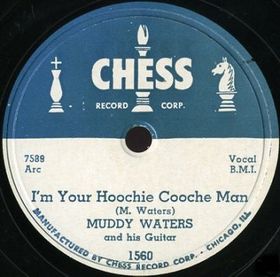 W
W"Hoochie Coochie Man" is a blues standard written by Willie Dixon and first recorded by Muddy Waters in 1954. The song makes reference to hoodoo folk magic elements and makes novel use of a stop-time musical arrangement. It became one of Waters' most popular and identifiable songs and helped secure Dixon's role as Chess Records' chief songwriter.
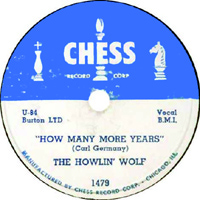 W
W"How Many More Years" is a blues song written and originally recorded by Howlin' Wolf in 1951. Recorded at the Memphis Recording Service – which later became the Sun Studio – it was released by Chess Records and reached No. 4 on the Billboard R&B chart. Musician and record producer T-Bone Burnett has described "How Many More Years" as "in some ways ... the first rock’n’roll song". It was a double-sided hit with "Moanin' at Midnight", which reached No. 10 on the R&B chart.
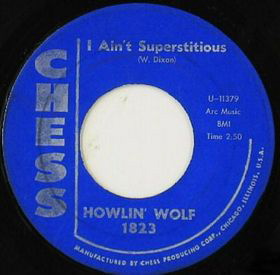 W
W"I Ain't Superstitious" is a song written by bluesman Willie Dixon and first recorded by Howlin' Wolf in 1961. It recounts various superstitions, including that of a black cat crossing the pathway. The song has been recorded by a number of artists, including Jeff Beck, whose blues rock adaptation in 1968 was named one of Rolling Stone magazine's "100 Greatest Guitar Songs of All Time".
 W
W"I Can't Hold Out", also known as "Talk to Me Baby", is a blues song written by Willie Dixon and recorded by Elmore James in 1960 for the Chess label. Called a classic and a "popular James standard", it has been interpreted and recorded by several artists.
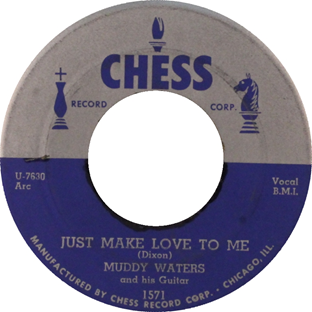 W
W"I Just Want to Make Love to You" is a 1954 blues song written by Willie Dixon, first recorded by Muddy Waters, and released as "Just Make Love to Me". The song reached number four on Billboard magazine's R&B Best Sellers chart.
 W
W"Johnny B. Goode" is a 1958 rock-and-roll song written and first recorded by Chuck Berry. The song was a major hit, peaking at number two on Billboard magazine's Hot R&B Sides chart and number eight on its Hot 100 chart.
 W
W"Killing Floor" is a 1964 song by American blues singer-songwriter and guitarist Howlin' Wolf. Called "one of the defining classics of Chicago electric blues", "Killing Floor" became a blues standard with recordings by various artists. It has been acknowledged by the Blues Foundation Hall of Fame, which noted its popularity among rock as well as blues musicians.
 W
W"Little Queenie" is a song written and recorded by Chuck Berry. Released in March 1959 as a double A-side single with "Almost Grown", it was included on Chuck Berry Is on Top (1959), Berry's first compilation album. He performed the song in the movies Go, Johnny Go! (1959) and Hail! Hail! Rock 'n' Roll (1987). It has been covered by many artists, including the Beatles, the Rolling Stones and REO Speedwagon. One year earlier, Berry had released "Run Rudolph Run", a Christmas song with the same melody.
 W
W"Little Red Rooster" is a blues standard credited to arranger and songwriter Willie Dixon. The song was first recorded in 1961 by American blues musician Howlin' Wolf in the Chicago blues style. His vocal and slide guitar playing are key elements of the song. It is rooted in the Delta blues tradition and the theme is derived from folklore. Musical antecedents to "Little Red Rooster" appear in earlier songs by blues artists Charlie Patton and Memphis Minnie.
 W
W"Mannish Boy" is a blues standard by Muddy Waters. First recorded in 1955, the song is both an arrangement of and an "answer song" to Bo Diddley's "I'm a Man", which was in turn inspired by Waters' and Willie Dixon's "Hoochie Coochie Man". "Mannish Boy" features a repeating stop-time figure on one chord throughout the song and is credited to Waters, Mel London, and Bo Diddley.
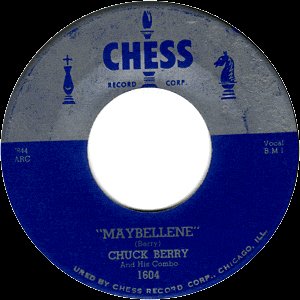 W
W"Maybellene" is a rock and roll song. It was written and recorded in 1955 by Chuck Berry, adapted in part from the Western swing fiddle tune "Ida Red". Berry's song told the story of a hot rod race and a broken romance, the lyrics describing a man driving a V8 Ford and chasing his unfaithful girlfriend in her Cadillac Coupe DeVille. It was released in July 1955 as a single by Chess Records, of Chicago, Illinois. Berry's first hit, "Maybellene" is considered a pioneering rock and roll song. Rolling Stone magazine wrote of it, "Rock & roll guitar starts here." The record was an early instance of the complete rock and roll package: youthful subject matter; a small, guitar-driven combo; clear diction; and an atmosphere of unrelenting excitement.
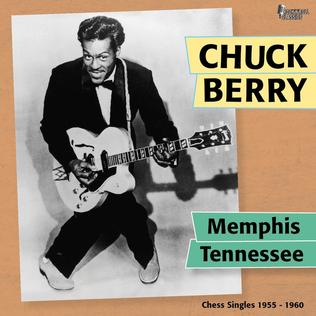 W
W"Memphis, Tennessee", sometimes shortened to "Memphis", is a song by Chuck Berry, first released in 1959. In the UK, the song charted at number 6 in 1963; at the same time Decca Records issued a cover version in the UK by Dave Berry and the Cruisers, which also became a UK Top 20 hit single. Johnny Rivers's version of the song was a number two US hit in 1964.
 W
W"Moanin' at Midnight" is a blues song written and recorded by Howlin' Wolf in 1951. The recording was released on Chess Records as his debut single. It charted on Billboard's R&B chart, but the B-side, "How Many More Years," became the popular side of the record.
 W
W"My Ding-a-Ling" is a novelty song written and recorded by Dave Bartholomew. It was covered by Chuck Berry in 1972 and became his only number-one Billboard Hot 100 single in the United States. Later that year, in a longer unedited form, it was included on the album The London Chuck Berry Sessions. Guitarist Onnie McIntyre and drummer Robbie McIntosh who later that year went on to form the Average White Band, played on the single along with Nic Potter of Van der Graaf Generator on bass.
 W
W"Nadine " is a song written and recorded by Chuck Berry. It was released as a single in February 1964 and was the first music that Berry released after finishing a prison term in October 1963.
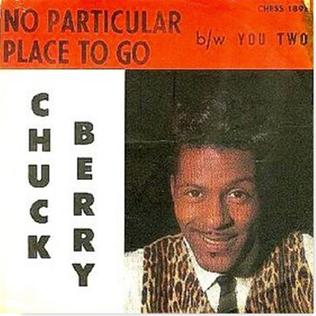 W
W"No Particular Place to Go" is a song by Chuck Berry, released as a single by Chess Records in May 1964 and released on the album St. Louis to Liverpool in November 1964.
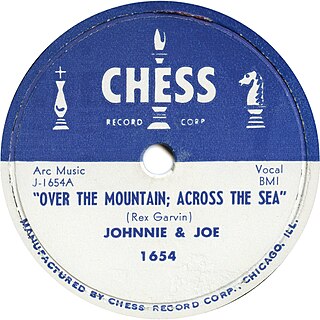 W
W"Over the Mountain; Across the Sea" is a song written by Rex Garvin. The song was a hit for Johnnie & Joe in 1957 and Bobby Vinton in 1963.
 W
W"Promised Land" is a song lyric written by Chuck Berry to the melody of "Wabash Cannonball", an American folk song. The song was first recorded in this version by Chuck Berry in 1964 for his album St. Louis to Liverpool. Released in December, 1964, it was Berry's first single issued following his prison term for a Mann Act conviction. The record peaked at #41 in the Billboard charts on January 16, 1965.
 W
W"Reelin' and Rockin'" is a song written and recorded by Chuck Berry. It was originally recorded in 1957 and released as the B-side of "Sweet Little Sixteen".
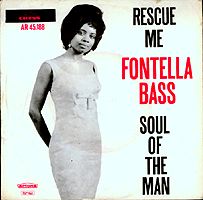 W
W"Rescue Me" is a rhythm and blues song first recorded and released as a single by Fontella Bass in 1965. The original versions of the record, and BMI, give the songwriting credit to Raynard Miner and Carl William Smith, although many other sources also credit Bass herself as a co-writer. It would prove the biggest hit of Bass's career, reaching #1 on the R&B charts for four weeks and placing at #4 on the Billboard Hot 100. "Rescue Me" also peaked at #11 on the UK Singles Chart.
 W
W"Rock and Roll Music" is a song written and recorded by Chuck Berry. It has been widely covered and is one of Berry's most popular and enduring compositions.
 W
W"Rocket 88" is a rhythm and blues song that was first recorded in Memphis, Tennessee, in March 1951. The recording was credited to "Jackie Brenston and his Delta Cats", who were actually Ike Turner and his Kings of Rhythm. The single reached number-one on the Billboard R&B chart.
 W
W"Roll Over Beethoven" is a 1956 hit single written by Chuck Berry, originally released on Chess Records, with "Drifting Heart" as the B-side. The lyrics of the song mention rock and roll and the desire for rhythm and blues to replace classical music. The title of the song is an imperative directed at the composer Ludwig van Beethoven to roll over out of the way and make room for the rock and roll music that Berry was promoting. The song has been covered by many other artists, including the Beatles and the Electric Light Orchestra. Rolling Stone magazine ranked it number 97 on its list of the "500 Greatest Songs of All Time".
 W
W"Rollin' Stone" is a blues song recorded by Muddy Waters in 1950. It is his interpretation of "Catfish Blues", a Delta blues that dates back to 1920s Mississippi. "Still a Fool", recorded by Muddy Waters a year later using the same arrangement and melody, reached number nine on the Billboard R&B chart. "Rollin' Stone" has been recorded by a variety of artists.
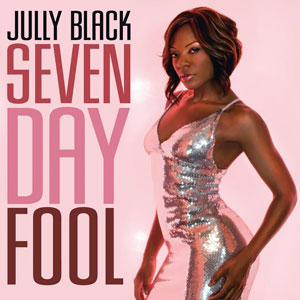 W
W"Seven Day Fool" is an R&B song written by Billy Davis, and first recorded by Etta James for Argo Records in 1961. The track was released both on a 45 RPM single, paired with "It's Too Soon to Know", and on her album The Second Time Around. Although not a big hit upon release, the track has since become very well known on the Northern Soul and Mod scenes in the UK.
 W
W"Smokestack Lightning" is a blues song recorded by Howlin' Wolf in 1956. It became one of his most popular and influential songs. It is based on earlier blues songs, and numerous artists later interpreted it.
 W
W"Spoonful" is a blues song written by Willie Dixon and first recorded in 1960 by Howlin' Wolf. Called "a stark and haunting work", it is one of Dixon's best known and most interpreted songs. Etta James and Harvey Fuqua had a pop and R&B record chart hit with their duet cover of "Spoonful" in 1961, and it was popularized in the late 1960s by the British rock group Cream.
 W
W"That's All Right"or "That's Alright" is a blues song adapted by Chicago blues singer and guitarist Jimmy Rogers. He recorded it in 1950 with Little Walter on harmonica. Although based on earlier blues songs, music writer John Collis calls Rogers' rendition "one of the most tuneful and instantly memorable of all variations on the basic blues format". The song became a blues standard and has been recorded by numerous blues and other artists.
 W
W"You Need Love" is a song with lyrics written by American blues musician Willie Dixon. The instrumentation was first recorded by slide guitarist Earl Hooker with backing musicians. Chicago blues artist Muddy Waters later overdubbed vocals and Chess Records released it as a single in 1962.
 W
W"You Never Can Tell", also known as "C'est La Vie" or "Teenage Wedding", is a song written by Chuck Berry. It was composed in the early 1960s while Berry was in federal prison for violating the Mann Act. Released in 1964 on the album St. Louis to Liverpool and the follow-up single to Berry's final Top Ten hit of the 1960s: "No Particular Place to Go", "You Never Can Tell" reached number 14, becoming Berry's final Top 40 hit until "My Ding-a-Ling", a number 1 in October 1972. The song performed slightly better in Canada, and also reached the Top 40 in the United Kingdom.
 W
W"You Shook Me" is a 1962 blues song recorded by Chicago blues artist Muddy Waters. Willie Dixon wrote the lyrics and Earl Hooker provided the instrumental backing; the song features Waters' vocal in unison with Hooker's slide-guitar melody. "You Shook Me" became one of Muddy Waters' most successful early-1960s singles and has been interpreted by several blues and rock artists.